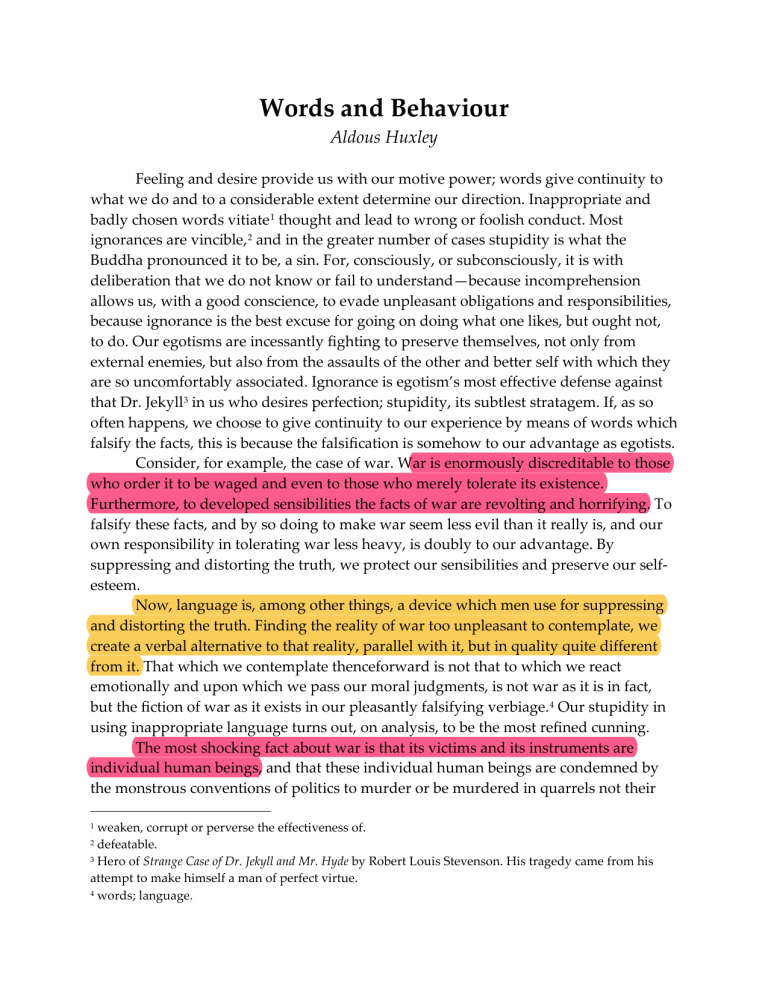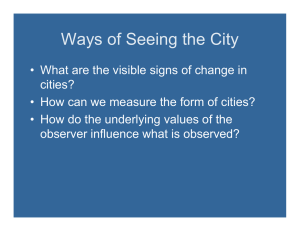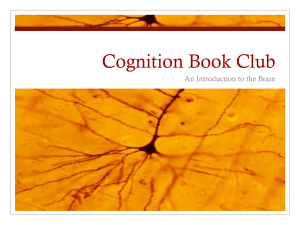
Words and Behaviour Aldous Huxley Feeling and desire provide us with our motive power; words give continuity to what we do and to a considerable extent determine our direction. Inappropriate and badly chosen words vitiate 1 thought and lead to wrong or foolish conduct. Most ignorances are vincible, 2 and in the greater number of cases stupidity is what the Buddha pronounced it to be, a sin. For, consciously, or subconsciously, it is with deliberation that we do not know or fail to understand—because incomprehension allows us, with a good conscience, to evade unpleasant obligations and responsibilities, because ignorance is the best excuse for going on doing what one likes, but ought not, to do. Our egotisms are incessantly fighting to preserve themselves, not only from external enemies, but also from the assaults of the other and better self with which they are so uncomfortably associated. Ignorance is egotism’s most effective defense against that Dr. Jekyll3 in us who desires perfection; stupidity, its subtlest stratagem. If, as so often happens, we choose to give continuity to our experience by means of words which falsify the facts, this is because the falsification is somehow to our advantage as egotists. Consider, for example, the case of war. War is enormously discreditable to those who order it to be waged and even to those who merely tolerate its existence. Furthermore, to developed sensibilities the facts of war are revolting and horrifying. To falsify these facts, and by so doing to make war seem less evil than it really is, and our own responsibility in tolerating war less heavy, is doubly to our advantage. By suppressing and distorting the truth, we protect our sensibilities and preserve our selfesteem. Now, language is, among other things, a device which men use for suppressing and distorting the truth. Finding the reality of war too unpleasant to contemplate, we create a verbal alternative to that reality, parallel with it, but in quality quite different from it. That which we contemplate thenceforward is not that to which we react emotionally and upon which we pass our moral judgments, is not war as it is in fact, but the fiction of war as it exists in our pleasantly falsifying verbiage. 4 Our stupidity in using inappropriate language turns out, on analysis, to be the most refined cunning. The most shocking fact about war is that its victims and its instruments are individual human beings, and that these individual human beings are condemned by the monstrous conventions of politics to murder or be murdered in quarrels not their weaken, corrupt or perverse the effectiveness of. defeatable. 3 Hero of Strange Case of Dr. Jekyll and Mr. Hyde by Robert Louis Stevenson. His tragedy came from his attempt to make himself a man of perfect virtue. 4 words; language. 1 2 own, to inflict upon the innocent and, innocent themselves of any crime against their enemies, to suffer cruelties of every kind. The language of strategy and politics is designed, so far as it is possible, to conceal this fact, to make it appear as though wars were not fought by individuals drilled to murder one another in cold blood and without provocation, but either by impersonal and therefore wholly non-moral and impassible forces, or else by personified abstractions. The battles are between Platonic ideas, between the abstractions of physics and mathematics. Forces interact; weights are flung into scales; masses are set in motion. Or else it is all a matter of geometry. Lines swing and sweep; are protracted or curved; pivot on a fixed point. Alternatively the combatants are personal, in the sense that they are personifications. There is “the enemy,” in the singular, making “his” plans, striking “his” blows. The attribution of personal characteristics to collectivities, to geographical expressions, to institutions, is a source of endless confusions in political thought, of innumerable political mistakes and crimes. Personification in politics is an error which we make because it is to our advantage as egotists to be able to feel violently proud of our country and of ourselves as belonging to it, and to believe that all the misfortunes due to our own mistakes are really the work of the Foreigner. It is easier to feel violently toward a person than toward an abstraction; hence our habit of making political personifications. In some cases military personifications are merely special instances of political personifications. A particular collectivity, the army or the warring nation, is given the name and, along with the name, the attributes of a single person, in order that we may be able to love or hate it more intensely than we could do if we thought of it as what it really is: a number of diverse individuals. In other cases personification is used for the purpose of concealing the fundamental absurdity and monstrosity of war. What is absurd and monstrous about war is that men who have no personal quarrel should be trained to murder one another in cold blood. By personifying opposing armies or countries, we are able to think of war as a conflict between individuals. The same result is obtained by writing of war as though it were carried on exclusively by the generals in command and not by the private soldiers in their armies. (“Rennenkampf had pressed back von Schubert.”) The implication in both cases is that war is indistinguishable from a bout of fisticuffs in a bar room. Whereas in reality it is profoundly different. A scrap between two individuals is forgivable; mass murder, deliberately organized, is a monstrous iniquity. We still choose to use war as an instrument of policy; and to comprehend the full wickedness and absurdity of war would therefore be inconvenient. For, once we understood, we should have to make some effort to get rid of the abominable thing. Accordingly, when we talk about war, we use a language which conceals or embellishes its reality. A dangerously abstract word, which figures in all discussions about war, is “force.” Those who believe in organizing collective security by means of military pacts 2 against a possible aggressor are particularly fond of this word. “You cannot,” they say, “have international justice unless you are prepared to impose it by force.” “Peace-loving countries must unite to use force against aggressive dictatorships.” “Democratic institutions must be protected, if need be, by force.” And so on. Now, the word “force,” when used in reference to human relations, has no single, definite meaning. There is the “force” used by parents when, without resort to any kind of physical violence, they compel their children to act or refrain from acting in some particular way. There is the “force” used by attendants in an asylum when they try to prevent a maniac from hurting himself or others. There is the “force” used by the police when they control a crowd, and that other “force” which they used in a baton charge. And finally there is the “force” used in war. This, of course, varies with the technological devices at the disposal of the belligerents, with the policies they are pursuing, and with the particular circumstances of the war in question. But in general it may be said that, in war, “force” connotes violence and fraud used to the limit of the combatants’ capacity. Reality is a succession of concrete and particular situations. When we think about such situations we should use the particular and concrete words which apply to them. If we use abstract words which apply equally well (and equally badly) to other, quite dissimilar situations, it is certain that we shall think incorrectly. Let us take the sentences quoted above and translate the abstract word “force” into language that will render (however inadequately) the concrete and particular realities of contemporary warfare. “You cannot have international justice, unless you are prepared to impose it by force.” Translated, this becomes: “You cannot have international justice unless you are prepared, with a view to imposing a just settlement, to drop thermite, 5 high explosives and vesicants 6 upon the inhabitants of foreign cities and to have thermite, high explosives and vesicants dropped in return upon the inhabitants of your cities.” At the end of this proceeding, justice is to be imposed by the victorious party—that is, if there is a victorious party. The next two sentences may be taken together. “Peace-loving countries must unite to use force against aggressive dictatorships. Democratic institutions must be protected, if need be, by force.” Let us translate. “Peace-loving countries must unite to throw thermite, high explosives and vesicants on the inhabitants of countries ruled by aggressive dictators. They must do this, and of course abide the consequences, in order to preserve peace and democratic institutions.” Two questions immediately propound 7 themselves. First, is it likely that peace can be secured by a process calculated to reduce a mixture of chemicals used in incendiary bombs. a chemical agent that causes burns and destruction of tissue. 7 to set forth; propose. 5 6 3 the orderly life of our complicated societies to chaos? And, second, is it likely that democratic institutions will flourish in a state of chaos? Again, the answers are pretty clearly in the negative. By using the abstract word “force,” instead of terms which at least attempt to describe the realities of war as it is today, the preachers of collective security through military collaboration disguise from themselves and from others, not only the contemporary facts, but also the probable consequences of their favorite policy. The attempt to secure justice, peace and democracy by “force” seems reasonable enough until we realize, first, that this noncommittal word stands, in the circumstances of our age, for activities which can hardly fail to result in social chaos; and second, that the consequences of social chaos are injustice, chronic warfare and tyranny. The moment we think in concrete and particular terms of the concrete and particular process called “modern war,” we see that a policy which worked (or at least didn’t result in complete disaster) in the past has no prospect whatever of working in the immediate future. The attempt to secure justice, peace and democracy by means of a “force,” which means, at this particular moment of history, thermite, high explosives and vesicants, is about as reasonable as the attempt to put out a fire with a colorless liquid that happens to be, not water, but petrol. The language we use about war is inappropriate, and its inappropriateness is designed to conceal a reality so odious that we do not wish to know it. The evil passions are further justified by another linguistic error—the error of speaking about certain categories of persons as though they were mere embodied abstractions. Foreigners and those who disagree with us are not thought of as men and women like ourselves and our fellow-countrymen; they are thought of as representatives and, so to say, symbols of a class. In so far as they have any personality at all, it is the personality we mistakenly attribute to their class—a personality that is, by definition, intrinsically evil. We know that the harming or killing of men and women is wrong, and we are reluctant consciously to do what we know to be wrong. But when particular men and women are thought of merely as representatives of a class, which has previously been defined as evil and personified in the shape of a devil, then the reluctance to hurt or murder disappears. Brown, Jones and Robinson are no longer thought of as Brown, Jones and Robinson, but as heretics, gentiles, Yids, niggers, barbarians, Huns, communists, capitalists, fascists, liberals—whichever the case may be. When they have been called such names and assimilated to the accursed class to which the names apply, Brown, Jones and Robinson cease to be conceived as what they really are—human persons— and become for the users of this fatally inappropriate language mere vermin or, worse, demons whom it is right and proper to destroy as thoroughly and as painfully as possible. Wherever persons are present, questions of morality arise. Rulers of nations and leaders of parties find morality embarrassing. That is why they take such pains to depersonalize their opponents. All propaganda directed against an opposing group has 4 but one aim: to substitute diabolical abstractions for concrete persons. The propagandist’s purpose is to make one set of people forget that certain other sets of people are human. By robbing them of their personality, he puts them outside the pale of moral obligation. Mere symbols can have no rights—particularly when that of which they are symbolical is, by definition, evil. Politics can become moral only on one condition: that its problems shall be spoken of and thought about exclusively in terms of concrete reality; that is to say, of persons. To depersonify human beings and to personify abstractions are complementary errors which lead, by an inexorable logic, to war between nations and to idolatrous worship of the State, with consequent governmental oppression. All current political thought is a mixture, in varying proportions, between thought in terms of concrete realities and thought in terms of depersonified symbols and personified abstractions. In the democratic countries the problems of internal politics are thought about mainly in terms of concrete reality; those of external politics, mainly in terms of abstractions and symbols. In dictatorial countries the proportion of concrete to abstract and symbolic thought is lower than in democratic countries. Dictators talk little of persons, much of personified abstractions, such as the Nation, the State, the Party, and much of depersonified symbols, such as Yids, Bolshies, Capitalists. The stupidity of politicians who talk about a world of persons as though it were not a world of persons is due in the main to self-interest. In a fictitious world of symbols and personified abstractions, rulers find that they can rule more effectively, and the ruled, that they can gratify instincts which the conventions of good manners and the imperatives of morality demand that they should repress. To think correctly is the condition of behaving well. It is also in itself a moral act; those who would think correctly must resist considerable temptations. 5



